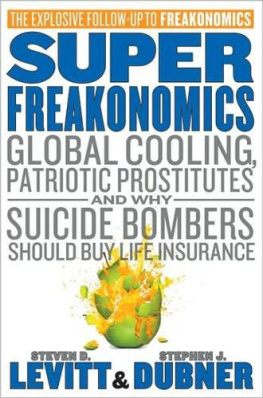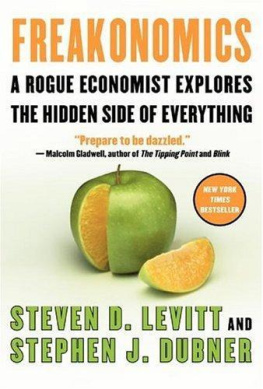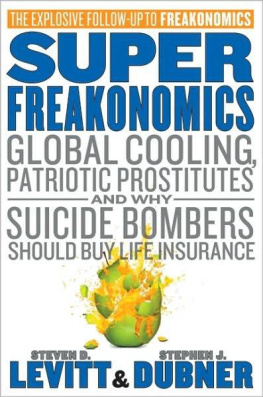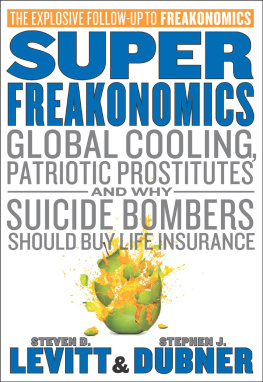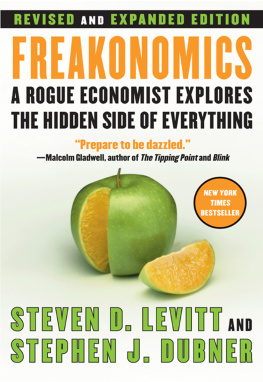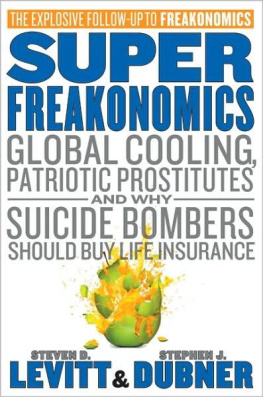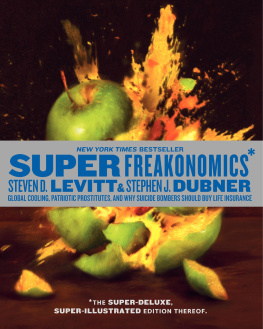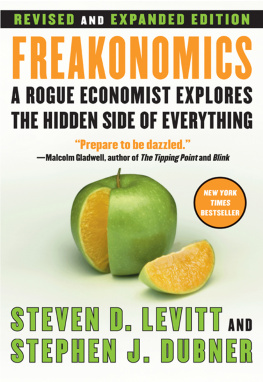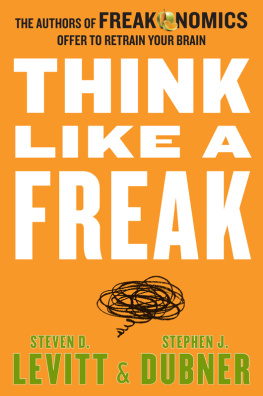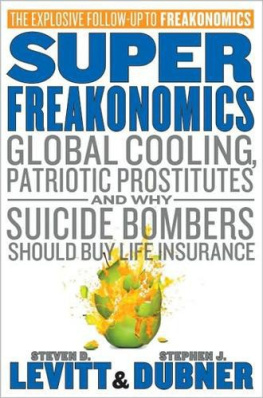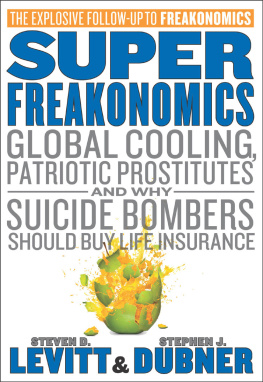AN EXPLANATORY NOTE
The time has come to admit that in our first book, we lied. Twice.
The first lie appeared in the introduction, where we wrote that the book had no unifying theme. Heres what happened. Our publishing housenice people, smart peopleread the first draft of our book and cried out in alarm: This book has no unifying theme! Instead, the manuscript was a random heap of stories about cheating teachers, self-dealing Realtors, and crack-selling mamas boys. There was no nifty theoretical foundation upon which these stories could be piled to miraculously add up to more than the sum of their parts.
Our publishers alarm only grew when we proposed a title for this mishmash of a book: Freakonomics. Even over the phone, you could hear the sound of palms smacking foreheads: This pair of bozos just delivered a manuscript with no unifying theme and a nonsensical, made-up title!
It was duly suggested that in the published book we concede right up front, in the introduction, that we had no unifying theme. And so, in the interest of keeping the peace (and our book advance), thats what we did.
But in truth, the book did have a unifying theme, even if it wasnt obvious at the time, even to us. If pressed, you could boil it down to four words: People respond to incentives. If you wanted to get more expansive, you might say this: People respond to incentives, although not necessarily in ways that are predictable or manifest. Therefore, one of the most powerful laws in the universe is the law of unintended consequences. This applies to schoolteachers and Realtors and crack dealers as well as expectant mothers, sumo wrestlers, bagel salesmen, and the Ku Klux Klan.
The issue of the books title, meanwhile, still lay unresolved. After several months and dozens of suggestions, including Unconventional Wisdom (eh), Aint Necessarily So (bleh), and E-Ray Vision (dont ask), our publisher finally decided that perhaps Freakonomics wasnt so bad after allor, more precisely, it was so bad it might actually be good.
Or maybe they were simply exhausted.
The subtitle promised that the book would explore the hidden side of everything. This was our second lie. We were sure reasonable people would view such a phrase as intentional hyperbole. But some readers took it literally, complaining that our stories, as motley a collection as they were, did not in fact address everything. And so, while the subtitle was not intended as a lie, it turned out to be one. We apologize.
Our failure to include everything in the first book, however, had an unintended consequence of its own: it created the need for a second book. But let it be noted straightaway that this second book and the first book combined still do not literally comprise everything.
The two of us have now been collaborators for several years. It began when one of us (Dubner, an author and journalist) wrote a magazine article about the other (Levitt, an academic economist). Adversaries in the beginning, albeit civil ones, we joined forces only when several publishers began to offer significant sums of money for a book. (Remember: people respond to incentivesand, despite the common perception, economists and journalists are people too.)
We discussed how the money should be divided. Almost immediately we came to an impasse, for each of us insisted on a 6040 split. Upon realizing that we each thought the other guy should get 60 percent, we knew wed have a good partnership. So we settled on 5050 and got to work.
We didnt feel much pressure writing that first book because we genuinely thought few people would read it. (Levitts father agreed and said it was immoral to accept even a penny up front.) These low expectations liberated us to write about any-and everything we found worthwhile. So we had a pretty good time.
We were surprised and thrilled when the book became a hit. As profitable as it might have been to pump out a quick follow-upthink Freakonomics for Dummies or Chicken Soup for the Freakonomics Soulwe wanted to wait until we had done enough research that we couldnt help but write it all down. So here we finally are, more than four years later, with a second book that we believe is easily better than the first. Of course it is up to you, not us, to say if that is trueor perhaps if its as bad as some people feared our first book might be.
If nothing else, our publishers have resigned themselves to our unyielding bad taste: when we proposed that this new book be called SuperFreakonomics, they didnt even blink.
If this book is any good, you have yourselves to thank as well. One of the benefits of writing books in an age of such cheap and easy communication is that authors hear directly from their readers, loudly and clearly and in great number. Good feedback is hard to come by, and extremely valuable. Not only did we receive feedback on what wed already written but also many suggestions for future topics. Some of you who sent e-mails will see your thoughts reflected in this book. Thank you.
The success of Freakonomics had one particularly strange by-product: we were regularly invited, together and separately, to give lectures to all sorts of groups. Often we were presented as the very sort of experts that in Freakonomics we warned you to watch out forpeople who enjoy an informational advantage and have an incentive to exploit it. (We tried our best to disabuse audiences of the notion that we are actually expert in anything.)
These encounters also produced material for future writings. During a lecture at UCLA, one of us (Dubner) talked about how people wash their hands after using the bathroom far less often than they admit. Afterward, a gentleman approached the podium, offered his hand, and said he was a urologist. Despite this unappetizing introduction, the urologist had a fascinating story to tell about hand-washing failures in a high-stakes settingthe hospital where he workedand the creative incentives the hospital used to overcome these failures. Youll find that story in this book, as well as the heroic story of another, long-ago doctor who also fought poor hand hygiene.
At another lecture, to a group of venture capitalists, Levitt discussed some new research he was doing with Sudhir Venkatesh, the sociologist whose adventures with a crack-selling gang were featured in Freakonomics. The new research concerned the hour-by-hour activities of street prostitutes in Chicago. As it happened, one of the venture capitalists (well call him John) had a date later that evening with a $300-an-hour prostitute (who goes by the name of Allie). When John arrived at Allies apartment, he saw a copy of Freakonomics on her coffee table.
Whered you get that? John asked.
Allie said a girlfriend of hers who was also in the business had sent it to her.
Hoping to impress Alliethe male instinct to impress the female is apparently strong even when the sex is already bought and paid forJohn said hed attended a lecture that very day by one of the books authors. As if that werent coincidence enough, Levitt mentioned he was doing some research on prostitution.
A few days later, this e-mail landed in Levitts in-box:
I heard through a mutual acquaintance that you are working on a paper about the economics of prostitution, correct? Since I am not really sure if this is a serious project or if my source was putting me on, I just thought I would put myself out there and let you know I would love to be of assistance.
Thanks, Allie
One complication remained: Levitt had to explain to his wife and four kids that he wouldnt be home the following Saturday morning, that instead hed be having brunch with a prostitute. It was vital, he argued, to meet with her in person to accurately measure the shape of her demand curve. Somehow, they bought it.

